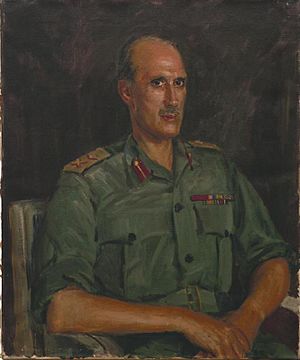Reginald Denning facts for kids
Quick facts for kids
Sir Reginald Denning
|
|
|---|---|
 |
|
| Born | 12 June 1894 Whitchurch, Hampshire, England |
| Died | 23 May 1990 (aged 95) Maidstone, Kent, England |
| Allegiance | United Kingdom |
| Service/ |
British Army |
| Years of service | 1914–1952 |
| Rank | Lieutenant General |
| Service number | 10930 |
| Unit | London Regiment Bedfordshire and Hertfordshire Regiment |
| Commands held | Northern Ireland District |
| Battles/wars | First World War Second World War |
| Awards | Knight Commander of the Royal Victorian Order Knight Commander of the Order of the British Empire Companion of the Order of the Bath Mentioned in Despatches |
Sir Reginald Francis Stewart Denning (born June 12, 1894 – died May 23, 1990) was a brave and important officer in the British Army. He served his country for many years. He was known for his leadership and planning skills.
Contents
A Life of Service
Reginald Denning was born in Whitchurch, Hampshire, England, in 1894. He had a famous brother named Alfred, who later became a well-known judge.
Joining the Army
Reginald joined the British Army when First World War started in 1914. He began as a private soldier. He was sent to the Western Front in France. This was a very dangerous place.
He fought in a battle near Ypres. He was very brave and even refused to become an officer at first. But his older brother convinced him to apply. In 1915, he became an officer in the Bedfordshire Regiment.
A Serious Injury
On June 15, 1915, Reginald was badly hurt. He was attacking enemy soldiers when a bullet hit him. It went through his shoulder and into the back of his head. He was left for dead on the battlefield.
About twelve hours later, he woke up. A brave corporal from his unit found him. The corporal carried him to a medical tent. After surgery, Reginald was sent back to England. Doctors put a metal plate in his head to help him recover.
Returning to Duty
Reginald got better from his injury. In 1918, he went back to France. He joined his regiment as a company commander. But his old wound caused him to collapse.
He was then moved to a different role. He worked at the headquarters of the Third Army. He helped with planning and organizing for the rest of the war. In 1919, he returned to his regiment. He helped train new soldiers.
For six years, he worked as an adjutant. This meant he helped manage the daily tasks of the regiment. In 1925, he went to the Staff College, Camberley. This is a special school for army officers. After his training, he served with his regiment in India and England.
World War II and D-Day
In 1936, Reginald joined the army staff again. He helped prepare the British Expeditionary Force. This was the British army sent to France at the start of Second World War.
After the Dunkirk evacuations, he was put in charge of defending South East England. In 1943, he became a major general. He was given a very important job: planning for D-Day. This was a huge invasion to free Europe from enemy control.
Reginald wanted to be part of the D-Day landings himself. He even asked to be lowered in rank so he could join the troops. But his request was not approved. After D-Day was a success, he went to Far East Command. He became the Chief Administrative Officer for the war in Southeast Asia.
Later Career and Retirement
In 1947, Reginald became Chief of Staff for Eastern Command. He also became the Colonel of the Bedfordshire and Hertfordshire Regiment. In 1949, he was promoted to lieutenant general. He was put in charge of the Northern Ireland District.
Reginald Denning retired from the army in 1952. He helped combine different army regiments. This led to the creation of the Royal Anglian Regiment. He was its first Colonel.
After retiring, he became chairman of the Soldiers', Sailors', and Airmen's Families Association. This group helps military families. He worked with them for over 20 years. For his hard work, he was made a Knight Commander of the Royal Victorian Order. He also served as a Deputy lieutenant for Essex from 1959 to 1968.
 | Claudette Colvin |
 | Myrlie Evers-Williams |
 | Alberta Odell Jones |

